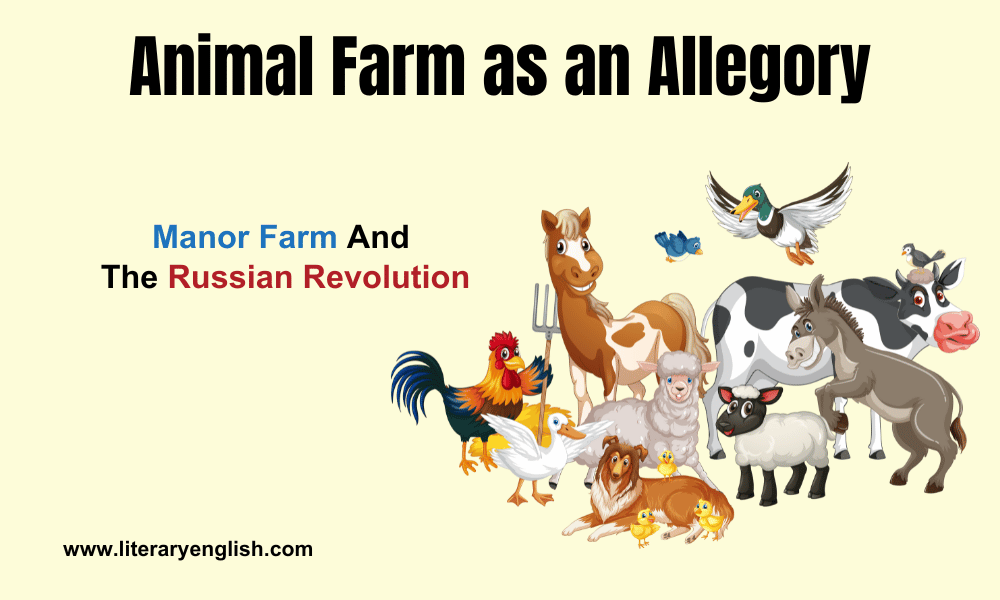What is an Allegory?
An allegory in literature is a narrative or a story in which characters, events, and settings symbolize abstract concepts, moral qualities, or historical events. Essentially, an allegory operates on two levels: the literal level, where the events unfold in a straightforward manner, and the symbolic level, where elements of the story represent deeper meanings or truths.
Allegories are commonly used to convey complex ideas or moral lessons in a more accessible and engaging way. By presenting abstract concepts through concrete and relatable characters and situations, allegorical works invite readers to explore deeper themes and draw their own interpretations.
Famous examples of allegorical literature include George Orwell’s “Animal Farm,” where farm animals represent political figures and systems, and John Bunyan’s “The Pilgrim’s Progress,” where the journey of the protagonist symbolizes the spiritual journey of a believer.
Animal Farm as an Allegory
George Orwell’s “Animal Farm” is an allegory for its powerful allegorical depiction of political tyranny and societal upheaval. Through the seemingly simple narrative of a farmyard rebellion, Orwell crafts a multi-layered allegory that resonates with readers across generations. This essay delves into the complex allegorical elements of “Animal Farm,” exploring the novel’s nuanced symbolism and its broader commentary on human nature, power dynamics, and the perils of totalitarianism.
Manor Farm and the Russian Revolution
At its core, “Animal Farm” serves as an allegory for the Russian Revolution of 1917 and its aftermath. Manor Farm represents Russia under Tsar Nicholas II’s oppressive rule, with Mr. Jones symbolizing the autocratic Tsar. The animals’ uprising against Jones parallels the Bolshevik Revolution, with Old Major embodying the revolutionary zeal of V. I. Lenin. Orwell meticulously aligns the events and characters of the farmyard with historical counterparts, offering a scathing critique of the revolution’s descent into despotism under Stalin’s regime.
Old Major, Napoleon, and Snowball
Each character in “Animal Farm” functions as an allegorical representation of real-life historical figures and ideological movements. Old Major, the visionary pig, mirrors Lenin’s revolutionary fervor and Marxist ideology. Napoleon, the ruthless and power-hungry pig, symbolizes Joseph Stalin and his authoritarian regime. Snowball, the eloquent and idealistic pig, embodies the spirit of Leon Trotsky and the opposition to Stalin’s tyranny. Through these characters, Orwell explores the corrupting influence of power and the betrayal of revolutionary ideals.
The Windmill, Seven Commandments, and Propaganda
Orwell employs rich symbolism and biting satire to convey his allegorical message in “Animal Farm.” The construction of the windmill represents Stalin’s industrialization drive and the utopian aspirations of communism. The Seven Commandments of Animalism symbolize the gradual erosion of principles and the perversion of ideals by those in power. Squealer’s manipulative propaganda tactics mirror the propaganda machinery of totalitarian regimes, highlighting the dangers of misinformation and indoctrination.
Universal Themes and Contemporary Relevance
While rooted in historical context, “Animal Farm” transcends its allegorical framework to address universal themes of power, corruption, and resistance. Orwell’s cautionary tale serves as a timeless warning against the dangers of unchecked authority and the need for eternal vigilance in safeguarding democratic principles. In today’s world, where echoes of authoritarianism reverberate, the allegorical lessons of “Animal Farm” remain as relevant as ever.
Conclusion
In “Animal Farm,” George Orwell masterfully weaves together history, allegory, and satire to create a compelling narrative that resonates with readers of all ages. Through its vivid characters, rich symbolism, and incisive commentary, the novel invites readers to reflect on the complexities of human nature and the enduring struggle for freedom and justice. As Orwell’s allegorical masterpiece continues to captivate audiences worldwide, its legacy serves as a poignant reminder of the power of literature to illuminate the darkest corners of society and inspire change.
Related Posts from Animal Farm
- Animal Farm in Historical Context
- Plot Overview of Animal Farm
- Introduction To Animal Characters
- Chapter-Wise Summary
- Symbolism in Animal Farm
- Principal Theme of Animal Farm
- Character Analysis Of Old Major
- Snowball vs. Napoleon
- Symbolic Significance of Bleating Sheep
- The Song “Beasts Of England” In George Orwell’s
